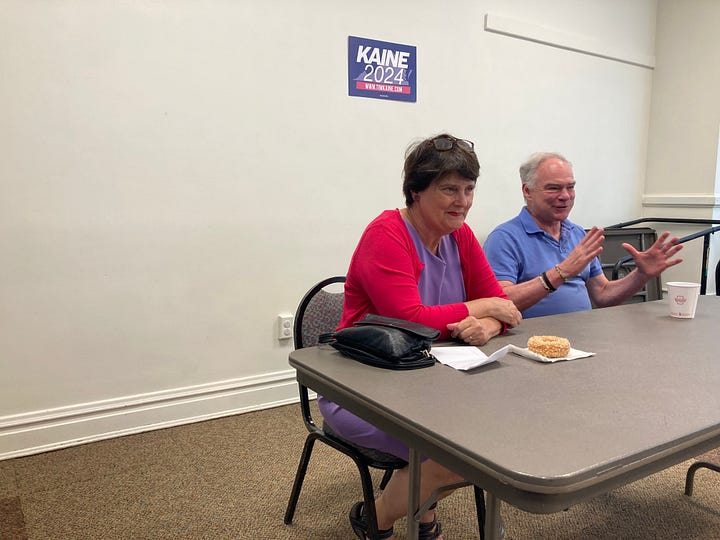Tim Kaine Holds Roundtable with Local Educators
Spotsylvania event is part of Senator's "Salute to Service" tour.
By Adele Uphaus
MANAGING EDITOR & CORRESPONDENT
Email Adele
Fredericksburg-area educators feel disrespected, distrusted, overburdened, overworked, and underpaid, they told Senator Tim Kaine and his wife Anne Holton at a roundtable Tuesday morning.
Yet national polls consistently show broad support among Americans for public schools in general — and strong support for their own local public schools.
“We’ve got to wake up that silent majority” to speak up in support of teachers and public schools, said Holton.


Tuesday’s roundtable, which brought together educators from Spotsylvania, Stafford, and Orange counties, was a campaign event for Kaine, who is running for reelection to a third term in the U.S. Senate in November.
Held at the Snow branch of the Central Rappahannock Regional Library in Spotsylvania, the event was a stop on Kaine’s “Salute to Service Tour” honoring Virginia’s public servants.
This week marks Kaine’s own 30th anniversary as a public servant, starting with his swearing in as a Richmond City Councilor on July 1, 1994.
Kaine and Holton — who currently serves on the state Board of Education as the last member appointed by former Governor Ralph Northam — are both strong supporters of public education, they said.
“Public schools are vital to democracy,” Holton said. “They are our melting pot. They’re where we help incorporate new Americans and where we learn to get along across similarities and differences.”
Kaine asked the educators to talk about the challenges and the successes they encounter in their jobs and give ideas of how the federal government can support them.
Teaching has always been a challenging and stressful job, but the COVID-19 pandemic turned “an uphill climb into Mount Everest,” said Devante Lucas, chorus teacher at Riverbend High School in Spotsylvania.
Matthew Lentz, a 30-year educator who now teaches German at Colonial Forge High School in Stafford, said there’s an expectation that teachers should “go the extra mile” without extra pay, because they’re not supposed to be in the profession for the money, but for their students.
“That sets us up to be taken advantage of,” he said. “When the money is not there, respect is not there.”


Kimberly Carryer, a biology teacher at Riverbend, said she feels teachers are not trusted as professionals, despite the requirement to be licensed and credentialed.
Standardized testing mandates and a lack of support from administrators who often bend to parental demands adds to the sense of feeling disrespected, the teachers agreed.
Holton said that Virginia doesn’t actually spend very much on its Standards of Learning tests, and that if it spent money to develop more efficient and comprehensive tests, localities wouldn’t need to administer supplemental tests — as many do now — to gather the data they need.
But she said this isn’t currently a priority of the state Board of Education.
Heather Drane, a history teacher at A.G. Wright Middle School in Stafford, said politicians at the national level, like Kaine, can work to reframe the narrative that denigrates educators and public schools.
They can also work to funnel more federal money to public schools, which largely are supported by state and local funds.
Spotsylvania School Board member Carol Medawar said the federal pandemic relief funds that expire in September of this year were “huge” for Virginia — paying for technology and student support positions to ease the burden on teachers.
When those funds expire, many of those positions will go away, Medawar said.
In addition to better pay and support, the roundtable participants said professional development targeted to what teachers at different levels of their career need, and robust career-switcher programs that take into account years of experience in the prior career, would help with teacher recruitment and retention.
But it wasn’t all negative —the educators had positive things to say about their students and about the job.
They said their students are more resourceful and aware of what’s going on in the world than previous generations.
“Nine out of 10” students fully embrace diversity, are “unbothered” by differences in ability and expression, and supportive of their peers with special needs, Carryer said.
Lentz said that what keeps him in the profession is “the impact you have on students that you don’t know about until years later.”
“There’s no other profession that I can think of gives that gift,” he said.
Follow us on Facebook | Instagram | YouTube
Local Obituaries
To view local obituaries or to send a note to family and loved ones, please visit our website at the link that follows.
Support Award-winning, Locally Focused Journalism
The FXBG Advance cuts through the talking points to deliver both incisive and informative news about the issues, people, and organizations that daily affect your life. And we do it in a multi-partisan format that has no equal in this region. Over the past month, our reporting was:
First to report on a Spotsylvania School teacher arrested for bringing drugs onto campus.
First to report on new facility fees leveled by MWHC on patient bills.
First to detail controversial traffic numbers submitted by Stafford staff on the Buc-ee’s project
Provided extensive coverage of the cellphone bans that are sweeping local school districts.
And so much more, like Clay Jones, Drew Gallagher, Hank Silverberg, and more.
For just $8 a month, you can help support top-flight journalism that puts people over policies.
Your contributions 100% support our journalists.
Help us as we continue to grow!





He needs to work on getting Joe gone. Try being useful to your constituency and the American public. Stop supporting the losing side of the race against Trump.